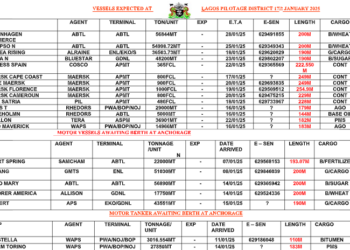There was palpable tension at the Tin Can Island Port yesterday as the Nigeria Customs Service officially began the implementation of the new tariff on the imported of second-hand vehicles into Nigeria.
Shipping Position Daily correspondent confirmed at the port that the Ministry of Finance had issued a circular to the Comptroller General of Customs that implementation of the new tariff on imported second hand vehicle should commence on March 1, 2014.
There was palpable tension at the Tin Can Island Port yesterday as the Nigeria Customs Service officially began the implementation of the new tariff on the imported of second-hand vehicles into Nigeria.
Shipping Position Daily correspondent confirmed at the port that the Ministry of Finance had issued a circular to the Comptroller General of Customs that implementation of the new tariff on imported second hand vehicle should commence on March 1, 2014.
The February 28, 2014 follow-up circular from the Customs headquarters to the effect that collection of new tariffs should commence March 1, was signed by Deputy Comptroller in charge of Tariff and Trade; Aliu GT. It was directed to ACGs, Zonal Coordinators, command Controllers, and heads of units.
Confirming the development to our correspondent, image maker of the Port and Terminal Multiservices Limited (PTML) command of the Customs; Mr Steve Okonmah said that the command received the circular from the Customs headquarters last week Friday.
It was also confirmed that the directive was in line with the February 28, 2014 deadline given for the old tariff structure to be stopped in line with the new automobile policy, which favours local assembly of vehicles. Our correspondent confirmed that Customs officers had stopped collecting ‘Entries’ from licensed custom agents, based on the old rates of duty since Monday,
Confirming the develoment to our correspondemt, the PTML Customs public relations officer, Mr Steve Okonmah said, "the policy has been on ground, we were supposed to have started implementing in January 2014, but we are only following the directive of the government, we do not make the law, but now we have just been directed to implement it to the later".
"On Monday, I went round to the various associations in this command and sensitized them about it, we appealed to them to conduct themselves maturely because we are not foreclosing any problems" Okonmah told our correspondent yesterday.
Going by the new tariff structure, duties and levies payable on imported new and used vehicles as well as imported new tyres the tariff have risen from 20 per cent to 70 per cent.
Shipping Position Daily recalls that the Federal Executive Council had late last year approved a new national automotive policy aimed at encouraging local production and assembling of new vehicles with an imposition of a high import tariff on fully built vehicles.
To give vent to the policy, the government had also released a two-page document in which it clarified that a fully built car would attract a duty of 35 per cent and a levy of another 35 per cent of the cost of the vehicle.
The document also explained that the Nigeria Customs Service “shall use the value of a new vehicle depreciated by 10 per cent per annum, implying 10 years period of cars and by seven per cent per annum implying 15 year period for commercial vehicles. In either case, depreciation should never be below 30 per cent of the value of the new vehicle equivalent.”
However it favoured local assembly plants, it stated that: “Local assembly plants shall import completely knocked down (vehicles) at zero per cent duty; and semi-knocked down (vehicles) at five per cent duty.
“Local assembly plants shall import fully built unit cars at 35 per cent duty and 20 per cent for commercial vehicles without levy, respectively in numbers equal to twice their CKD/SKD kits.
Imported tyres would also cost more as from next year as 20 per cent duty and five per cent value added tax have been placed on tyres of cars, buses and lorries.
“Local tyre manufacturing plants are to import tyres at five per cent duty in numbers equal to twice their production for two years from the date of commencement of production,” it stated.
Meanwhile, in a swift reaction to the development, freight forwarders have threatened to close the ports and shut all operations if the government refuses to revert to the old tariff.
While reacting to whether or not the new system will not encourage high-handedness on the part of Valuation Officers, Okonmah assured that the Valuation Officers have already been trained and briefed on what should be done with regards to the new tariff regime.
While reacting to the development also, a National Officer of the National Association of Government Approved Freight Forwarders (NAGAFF); Mr. Ugochukwu Nnadi told our correspondent that the new policy is punitive and uncalled for.
"It is punitive and I don't see any reason for it, the legislature has powers to checkmate the executive when there are excesses, and in this case I think there are excesses in tariff regulation, the National Assembly should step in and call them to order", he argued.
Nnadi said that the customs, as a result of the circular refused to attend to clearing agents on Tuesday.
According to him, the implementation has started, even though it has not been effected on the Customs system.
"I have not seen anybody paying, the reaction at the port right now is that of apprehension because there is an uneasy calm now, some people have started leaving for their homes because there is nothing for them again today" he said.
Our correspondent gathered from freight forwarders at the PTML terminal that already, information has come out from valuation unit that private vehicles above 10 years should not be imported, while commercial vehicles above 15 years should also not be imported.
















Discussion about this post